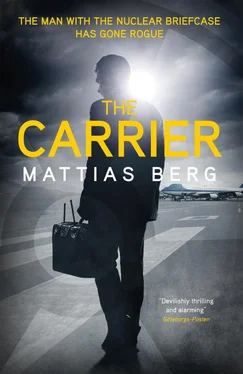Mattias Berg - The Carrier
Здесь есть возможность читать онлайн «Mattias Berg - The Carrier» весь текст электронной книги совершенно бесплатно (целиком полную версию без сокращений). В некоторых случаях можно слушать аудио, скачать через торрент в формате fb2 и присутствует краткое содержание. Город: London, Год выпуска: 2019, ISBN: 2019, Издательство: MacLehose Press, Жанр: Триллер, на английском языке. Описание произведения, (предисловие) а так же отзывы посетителей доступны на портале библиотеки ЛибКат.
- Название:The Carrier
- Автор:
- Издательство:MacLehose Press
- Жанр:
- Год:2019
- Город:London
- ISBN:978-0-85705-788-4
- Рейтинг книги:4 / 5. Голосов: 1
-
Избранное:Добавить в избранное
- Отзывы:
-
Ваша оценка:
- 80
- 1
- 2
- 3
- 4
- 5
The Carrier: краткое содержание, описание и аннотация
Предлагаем к чтению аннотацию, описание, краткое содержание или предисловие (зависит от того, что написал сам автор книги «The Carrier»). Если вы не нашли необходимую информацию о книге — напишите в комментариях, мы постараемся отыскать её.
The Carrier — читать онлайн бесплатно полную книгу (весь текст) целиком
Ниже представлен текст книги, разбитый по страницам. Система сохранения места последней прочитанной страницы, позволяет с удобством читать онлайн бесплатно книгу «The Carrier», без необходимости каждый раз заново искать на чём Вы остановились. Поставьте закладку, и сможете в любой момент перейти на страницу, на которой закончили чтение.
Интервал:
Закладка:
“But in the end, that’s how it turned out: at your home in Ursvik, of all places. And at long last I want to take this opportunity to thank you for the fact that you too, in turn, have made it possible for me to be standing here today. That you have indirectly played your part in what we are now on the way to accomplishing. So skål and a hugely happy birthday, dearest Aina! Your place in history is secure.”
Sixten refilled our glasses once more before we clinked them in toast and were about to take our places at the table. I picked up my hybrid again and fingered the key in the right-hand trouser pocket of my dinner jacket. Held back a little as we made our way to the kitchen.
“Yet there’s not a single word in my dissertation about any underground laboratory,” I said, as quietly as possible.
Ingrid leaned closer. Her breath carried the fruity aroma of vintage champagne.
“No, I promised Lise that, my treasure. That she could take the secret to the grave with her.”
Then she put her mouth to my ear: her warmth burned on my skin.
“But in practice it makes no difference, since the key has been lost without trace for decades. So no-one other than the angels knows what’s under that trap-door.”
2.14
It was impossible to concentrate. However much Aina asked, however hard she pushed me. Because I was thinking about the key, the trap-door, the laboratory, what Ingrid had said. And the two messages to my cell phone. Edelweiss’ gentle voice. The photograph of Zafirah with the jerry can.
So there I sat, looking for alternatives, emergency exits, while Sixten placed the first course and then the main course on the table. Toast Skagen with fresh shrimp and Kalix bleak roe, filet of beef with Hasselback potatoes and morel sauce.
But Aina would not give up. From somewhere far away—although she was only on the other side of the table—she kept questioning me in her strong Swedish accent. She had a firm grasp of English terminology, all the technical terms: seemed to know most of what there was to know about even our own nuclear weapons. The whole expansion which the rest of the world had long since interpreted as disarmament. All of those damned speeches.
It was more reminiscent of an interrogation training session than a conversation. Aina’s sharp look, her fiery, or maybe implacable, side. Her narrowed eyes which could surely see through anybody. The rest of the company—the birthday dinner party—slowly but surely faded away around us.
And in the end I could not resist. Talking as ever on a general level, no classified information, but still, I told Aina that our so-called “Revitalization” would cost us at least 350 billion dollars in the coming decade. And that the total cost for the world’s nuclear weapons arsenals at the moment was estimated to amount to a trillion dollars per decade.
Because those in the humanities are often mathematically illiterate, I felt I had to clarify the amount. A one and twelve noughts. One million million. This before the vast world-wide rearmament, phase two, which would be the secondary result of our own efforts, I said.
Aina nodded eagerly. She reminded me so much of my mother before she vanished into herself: the same warm acuity. I gave her more to nibble on. Details of how much we were spending on nuclear weapons research right now, without the media bothering very much about it—at the same time as we were using all our negotiation skills and rhetoric to stop more countries from starting their own little Doomsday kits.
I took a deep breath and rattled off information. Told her that in the last financial year 433 nuclear weapons projects had been carried out at the Sandia National Laboratory, with a total budget of 2.5 billion dollars. Los Alamos had 293 projects costing 2 billion, Lawrence Livermore 159 projects for just over 1.5 billion, Y-12 seventy-six projects for 800 million, Kansas City 102 projects for 600 million, Nevada forty projects for 400 million, Pantex nineteen projects for half a billion and Savannah River ten projects for 150 million dollars.
“It’s so incredibly difficult to take you seriously,” Aina said.
I did not answer—because I did not know if Aina was being dismissive about us here now, our wounded little team, or about the entire nation.
“And yet we have to. Every second.”
I said nothing. Listened for sounds from outside, any sign from the attackers, somewhere beneath Sixten and Ingrid’s restrained conversation about the old times. Jesús María was not there at all, she must have gone to the bathroom.
“How do you mean, Aina?”
“Where to begin? Perhaps with your sporting talk: about the nuclear football, or the ‘baseball’ cards?”
Then she began questioning me about the briefcase and the cards, which reminded her of the collectors’ cards from childhood. On the front there was a photograph of the possible terrorist. On the back, succinct facts: name, home town, relationships, suspected crimes, the basic necessities for those who ordered our drones into Pakistan, Syria or Afghanistan. So as to be able to lock the sight on that specific person’s cell phone—regardless of who might be holding it at the moment of impact.
“What we’re talking about is a death sentence which is completely unjustifiable from any legal point of view,” Aina said.
Then she went on about how vulnerable the system was. The fact that around one thousand of our warheads, and about the same number of Russian ones, are incessantly online, fully primed to be launched at any moment.
“Isn’t it strange, Erasmus, that everybody talks about this as if it were in the past, in the imperfect tense: joking about the Cold War—without realizing that the situation is unchanged today. And, with extinction, there are no nuances. Even if the number of warheads ready to be fired off during the worst years was perhaps three times as high as now, it’s still more than enough. The combined explosive force of the American missiles alone can wipe out mankind—and make the globe uninhabitable for all time. In addition to disturbing the equilibrium of the universe, what with the effect of the sun through all those dust clouds rising high into the atmosphere and the cold emanating from the then desolate Tellus, well, you know…”
Aina emptied her glass, and kept on talking to me as if I had no role in the current events.
“And imagine if, or rather when, all of this is hacked. It is after all more than twenty years since Kevin Mitnick was said to be able to start a nuclear war simply by whistling into a pay phone…”
I naturally said nothing about the fact that, at that moment, our entire nuclear weapons system appeared to have been both hacked and encrypted by a lone individual. Out of the corner of my eye I saw how precisely that woman was leaning further and further over the table, ever closer to Sixten. As if lost in their common history.
Aina did not spare either of them a look.
“Recently I also heard a lecture on what are called autonomous weapons systems: war launched without us being involved. The academic said that man is more and more being regarded as the weak link in the chain. That we will soon find ourselves outside the ‘decision loop’, as she put it.”
A scent wafted from the other side of the table, so distant and yet so familiar. Chanel No. 5, the most classic of perfumes. My mother’s party perfume. I thought about remarking that Aina and she used the same fragrance. But I could not get a word in edgeways.
“And it’s certainly not only you, Erasmus. The lunacy is spreading all over the world again. North Korea, Iran, this appalling Islamic State which could get its hands on a warhead, and Russia obviously. Did you know that the Russians practiced offensive nuclear weapons attacks on us as recently as last Easter, on Good Friday, as if nothing were sacred? The targets were in part the National Defense Radio Establishment on Lovön island, which would have destroyed our early-warning system, and the air base at Haghult. I assume you picked it up on your screens.”
Читать дальшеИнтервал:
Закладка:
Похожие книги на «The Carrier»
Представляем Вашему вниманию похожие книги на «The Carrier» списком для выбора. Мы отобрали схожую по названию и смыслу литературу в надежде предоставить читателям больше вариантов отыскать новые, интересные, ещё непрочитанные произведения.
Обсуждение, отзывы о книге «The Carrier» и просто собственные мнения читателей. Оставьте ваши комментарии, напишите, что Вы думаете о произведении, его смысле или главных героях. Укажите что конкретно понравилось, а что нет, и почему Вы так считаете.












